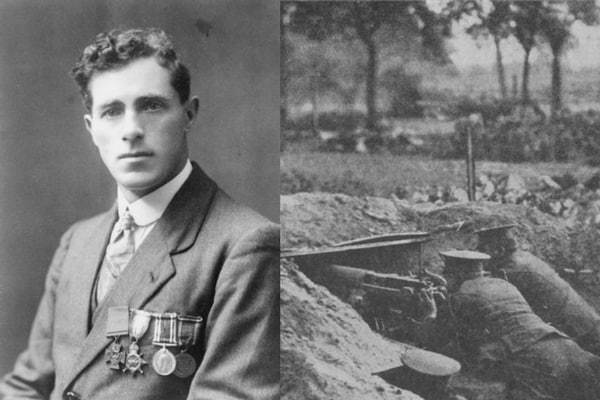On the ongoing 100th anniversary of “the Great War”, we have been remembering the massive battles and political implications of a war that too often gets overshadowed in academia and popular knowledge by the WWII. We can remember the epic and terrible battles such as those fought at Verdun, Ypres, and Megiddo, but it is also important to remember the amazingly heroic deeds of individuals. And few deeds were as singularly awesome as Horace Augustus Curtis’ actions that would win him the Victoria Cross.
Curtis joined the war as soon as he could, at 23 years old in 1914, years before his eventual heroism. He joined the mostly Irish 10th Division of the British army, one that was personally inspected by King George V. first up for the new division was an attack against the Ottomans at Gallipoli, landing at Sulva Bay. This would be the first of four theatres of war Curtis would fight in, truly showing the “world” aspect of World War One.
The Gallipoli Campaign was a monumental struggle between the over-confident Brits and the wholly underestimated power of the Ottoman Empire. As Russia was an important ally of France and Britain, the fact that the only sea route through the Dardanelles was controlled by the enemy Ottomans was a problem.

Almost half a million troops invaded the narrow peninsula with the main objective of securing a trade route to Russia through the Black Sea. The Ottoman Empire had been in an undeniable state of decline for generations. The Ottomans were even referred to as “the sick man of Europe,” but Gallipoli gave them a chance to prove themselves.
Though a relatively small and reasonable target for hundreds of thousands of troops, Gallipoli was a slugfest where the Ottomans would gain one of their greatest victories of the war, stalling the invasion and relegating the British invasion to a series of beachheads reaching, at most, four miles inland.
Though the attacks were halted, it in no way diminishes the service of the British Australian and New Zealand troops, solidifying their national pride. ANZAC day, the veteran’s day equivalent in Australia and New Zealand began in remembrance of the ANZAC involvement in Gallipoli

After months of making no progress, the Brits sought a large push to break through the lines and take the pesky peninsula once and for all. This is where Curtis and the 10th came in. Sulva Bay, just north of the small ANZAC beachhead could break open the Ottoman defense.
Despite good initial landings and decent progress, British commanders became almost lethargic and further gains came slowly in the wake of estimations saying that they had over a day before Ottoman reinforcements would arrive. A late forced march during the evening hours to reach a ridge was thwarted as the Ottomans crested the heights just before the exhausted British troops arrived. A barrage of fire and a downhill Ottoman bayonet charge decimated the British attack.
Though the troops were ready to fight, command incompetence led to a disastrous battle with twice as many casualties as the whole allied losses at the D-day landings 30 years later. The rest of the campaign didn’t fare much better. Reports estimated that a full quarter of the 10th was killed in the campaign and only 25% got through the campaign still fit to fight. Curtis fought in these terrible conditions, being sent without adequate fresh water in the sweltering heat and then having to wait for unsure commanders to make decisions.

